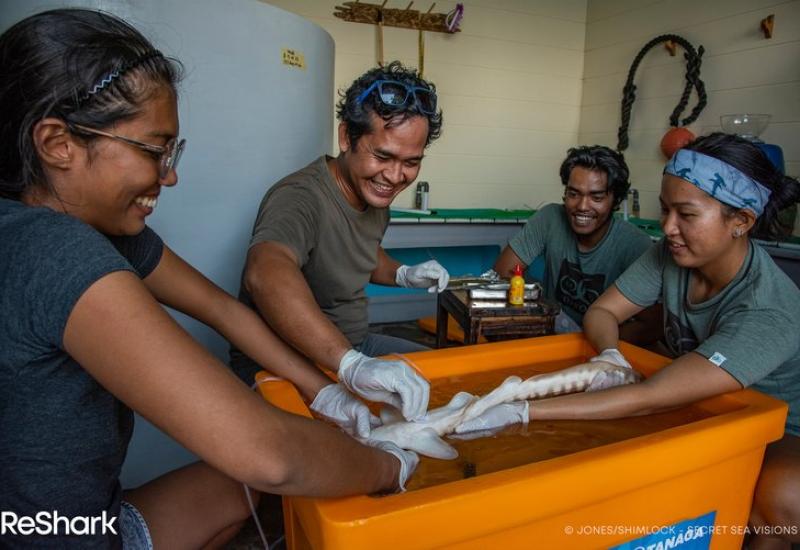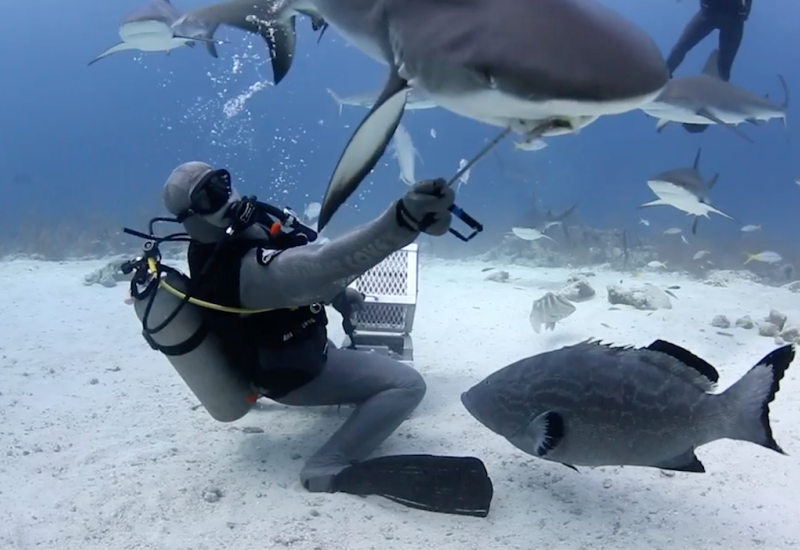Sharknado and Sharktopus and Megalodon, Oh My!

SYFY FilmsSHARKNADO 2
A little more than 40 years ago, Jaws hit the big screen, and totally changed how the world views sharks, inspiring public terror (as well as inspiring a generation of marine biologists). Jaws has so thoroughly influenced the real world that the marine policy literature refers to “The Jaws Effect,” in which government officials rush to “do something” in response to shark bites to avoid looking like the ineffective fictional mayor of Amity Island.
In recent years, sharks have become the star of a whole new genre of film: the bad shark movie. While some of these like Deep Blue Sea and 47 Meters Down make it to the big screen, a growing number of these bad shark movies, like Sharktopus and Sharknado, are made for TV or direct to DVD release. Why are these bad shark movies so popular, and do they have the same impact on public perception of sharks and shark conservation as Jaws had decades ago?
Let’s answer the second question first: I do not believe that movies like Mega Shark vs. Giant Octopus or Sharknado 2: The Second One (yes it’s really called that) have the same influence on public perception of sharks that was seen with Jaws.
These movies are in on the joke. (See why one writer says the new 47 Meters Down installment isn't in on the joke.) They don’t take themselves seriously and they don’t expect their viewers to take them seriously, either. However, in the interest of transparency, I should note that Sharknado 2 is thanked in my Ph.D. dissertation—the producers directly supported my graduate school research! (If anyone wants to test if my opinion about shark conservation is influenced by money, I take PayPal).
And now for the first question: Why are these movies so popular? Because sharks are an increasingly large part of popular culture in general. Characters on TV shows as varied as South Park (Cartman’s pajamas), Gilmore Girls (Kirk’s shirt), Fuller House (the school mascot), and Ru Paul’s Drag Race (a design by Katya) have worn shark chic clothing (Follow #ElasmoSwag on Instagram to track all my documentation of people wearing sharks on their outfits). Target currently sells four different styles of shark print bedding for kids (it sadly doesn’t come in adult sizes, I checked). The longest-running cable series in history is Shark Week (which is itself a mixed bag for public understanding of sharks) And the less said about “Baby Shark” the better, though I will note that the actual story of this century-old song is morbidly fascinating.
In short, sharks are having a pop culture moment, and sharks are in! Why? The answer is simple—because humans love animals, and humans love being scared, so potentially scary animals are popular.
As a fan of the genre, I fear that bad shark movies are destined to fade away. After all, you can only make Sharktopus more ridiculous by making it fight a WhaleWolf so many times, and there’s only so many other things you can put in a tornado with sharks to up the stakes (real things in Sharknado sequels included nuclear waste). After defeating the giant octopus, the mega shark has since taken on Crocosaurus and even a giant manmade Mecha Shark, but it’s running out of enemies. Two-headed shark attack was followed by three-headed shark attack, five-headed shark attack, and six-headed shark attack, but after a certain point it’s just getting silly.
And The Meg is based on a book series with multiple entries, but I hope that they’ll stop making sequels to that film before we get to the ancient whales that have evaded detection by modern-day humans because they evolved to breathe through gills rather than breathing air, as well as hiding in the deep sea and under Antarctica. (these are real things that happen in the sequels; I should know, there’s a character named after me in Meg 4: Hell’s Aquarium.)
Public perception of sharks matters because it influences public support for shark conservation, but “people are afraid of sharks” hasn’t been the biggest threat that sharks face for a long time, and countering this fear shouldn’t be the sole focus of public outreach for shark conservation. But even if it was, a half-shark half-octopus attacking a flying barracuda/dinosaur hybrid (pteracuda) isn’t going to make people terrified of sharks in the same way that Jaws did. So I recommend that you buckle up and enjoy the delightfully stupid ride.

Josh LibermanDr. David Shiffman
About David Shiffman
Dr. David Shiffman is a marine conservation biologist specializing in the ecology and conservation of sharks. An award-winning public science educator, David has spoken to thousands of people around the world about marine biology and conservation, and has bylines with the Washington Post, Scientific American, New Scientist, Gizmodo and more. Follow him on Twitter, Facebook and Instagram @WhySharksMatter, where he’s always happy to answer any questions about sharks. Please direct any questions or hate mail to [email protected].
About Science Stop with Dr. David Shiffman
Before you surface from a deep scuba dive, you make a safety stop. Before you take a deep dive into the complicated world of ocean conservation, I encourage you to make a science stop by reading this column. The global environmental challenges we face can seem overwhelming, and concerned citizens, especially people like scuba divers who love spending time in the ocean, want to help do their part to fix these problems. However, with lots of conflicting, misleading or just plain wrong information out there about environmental problems and how you can help solve them, it can be hard to know how to help. In some cases, well-intentioned but misinformed activists not only fail to help solve a problem, but can actually make the problem worse, or harder to solve! Put simply, if we’re going to fix the massive problems facing the ocean, the details matter, and those details can be confusing! In this monthly column, my goal is to teach you the true scientific facts behind some of the most pressing threats facing the ocean and the solutions experts believe will help solve them. I will also try to dispel common misconceptions about these threats and their solutions.










